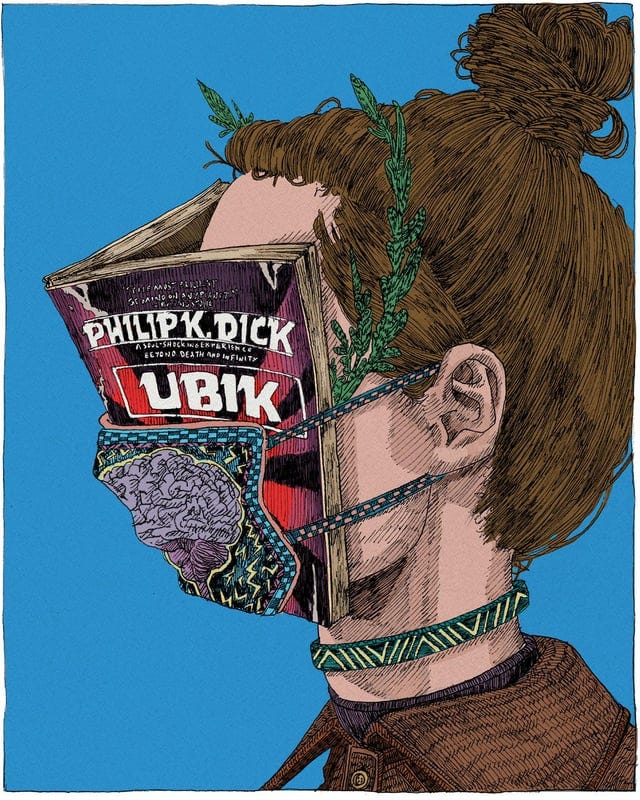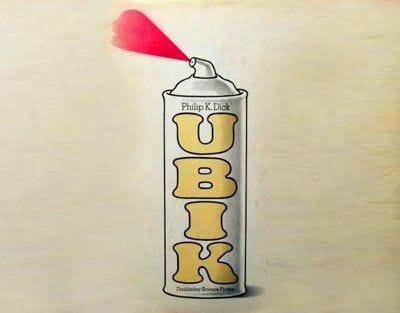Book review: Ubik
Philip K Dick's 1969 amphetamine-inspired classic
I read Ubik as part of book club; you can listen to our conversation here. My take on the book was obviously informed by that discussion, so you’re free to assume that anything stupid or wrong I write here originated with Rich or Cam. You can read about the origin of the book club here.
Central to fiction is world building: creating the set and setting of the novel and the rules of the game. Sometimes the fictional world is much like our own and the world building consists of creating new characters and social relationships. And sometimes the fictional world is radically different, involving space travel, new physics, or waking up for your sales job only to notice you’re now a giant cockroach.
As readers, we get to engage in a prolonged thought experiment as we are exposed to the world that the author has built for us. From Dostoevsky we learn what it's like to suffer the psychological consequences of committing wanton violence. From Ursula K Le Guin we learn what it's like to live in an anarcho-syndicalist society. Ted Chiang has us explore a world in which we have instant video access to anything in our past, and Nabokov puts us inside the head of a pedophile (and makes us enjoy it).
How much should an author explore the world they’ve built in the text? Fiction, after all, is not math: we shouldn't want the author to deliberately lay out their axioms and then dutifully deduce all the consequences. Much should remain hidden from the reader, with hints given only as necessary. This is why good fiction requires interpretation. It's also why some interpretations are better than others—some hew to the spirit of the world more successfully.
As readers, we shouldn’t expect the author to divulge everything, but we should expect that there is an underlying logic to the world we're exploring. We should expect that the authors know the rules they're operating with, even if those rules are not made explicit. We should, at minimum, expect that the world is self-consistent. Raskolnikov shouldn't wake up one morning, guilt-free, and decide to go to Ibiza on vacation. Odysseus shouldn't stop trying to get home. Ahab shouldn't decide to open up a pizzeria—white whale be damned.
This creates a pact between reader and writer. The writer creates a rich, consistent new world and shows part of it to the reader. They promise that they’ve thought deeply about the ideas, the logic, the structure. The reader takes the world seriously, exploring and interpreting it. They develop theories about the work, based on the premise that what happens on each page isn’t entirely random.
Or so I thought. Philip K Dick apparently never agreed to this pact. The writers at Time magazine also have not heard of this pact, seeing as they ranked Dick's novel Ubik, his 1969 classic, among the top 100 all time novels of the past 100 years.
Ubik reads like the first draft by a brilliant but drug-addled high school student. In fact, in many ways, this is probably accurate. Philip K Dick was broke, addicted to amphetamines, and wrote a 1000 page exegesis about his divine interventions after getting his wisdom teeth removed. He published 44 novels and more than a hundred short stories before dying in early fifties.

In Ubik, Dick throws a torrent of ideas at the wall and doesn't even wait around to see if something sticks. He doesn't make sure the ideas are consistent, let alone explore their consequences. The ideas are certainly interesting—Dick was arguably the first to introduce many concepts that are common in sci-fi today, like living in a simulation—but they are not packaged into a satisfying story.
Ubik takes place in a world where psychic powers are commonplace. There are at least two types of psychics: "precogs" which can see the future and "telepaths" which can listen to your thoughts. The story follows Joe Chip, a grumpy and debt-riddled employee who can’t leave his apartment because his front-door is coin operated and he doesn’t have the cash. (One imagines that Joe is a stand-in for Dick, given his preoccupation with speed.) Joe works at Runciter associates, a firm which specializes in training "inertials," people who can combat the powers of other psychics, and hiring them out to companies.
Joe meets Pat Conley, a psychic with a new and apparently unique ability: she can undo events by changing the past. Pat is the sexy femme fatale of the novel. Joe is skeptical of her abilities until she takes a shower at his apartment, then he’s sold. At one point she changes the past so that she and Joe are married. Their nuptial status is unclear for the rest of the book. If this is confusing, no problem. Pat Conley is irrelevant for the plot, and can safely be forgotten.
Joe Chip is recruited along with twelve others to go investigate some shifty psychic behavior on the moon. The man who recruits them turns out to be a human bomb, floats up to the ceiling and explodes, killing their boss Glenn Runciter, the head of Runciter associates. The team scrambles to get Runciter back to earth in order to get him into half life—a technology that preserves the recently deceased in a state of cold-pac so their consciousness can survive and communicate with the living.
But odd things start happening to Joe and team. The coffee goes bad instantly, their cigarettes go stale, their technology reverts to earlier forms. They start receiving messages from the presumed-to-be-dead Runciter at the bottom of urinals. Surprise: they're the ones in half life. Surprise number two: They're being hunted by a psychotic-or-perhaps-simply-tragically-misunderstood teenager named Jory (mentioned once in the story previously before turning out to be the arch-villain). Jory has learned to eat other half-lifers to extend his own half-life, and by God Jory is hungry.
Thankfully, Jory has been kept at bay by Runciter's extremely young and attractive wife Ella, who herself has been in half life this whole time. Ella has been using Ubik to battle Jory in some undisclosed way, a product which halts the decaying process. Us readers have seen this mysterious substance before. Each chapter opens with an advertisement for Ubik as different products: hair spray, instant coffee, car wax, deodorant—usually promising to preserve or freshen whatever you put it on.

The novel ends with Joe Chip taking over for Ella in the eternal battle against Jory because Ella has pressing business elsewhere. Initially Joe can't find any Ubik but then, always quick on his feet, he thinks really really hard about it and a can of Ubik appears. Close call.
Ubik is certainly fun. But a great novel should be fun, consistent, and thought-provoking. The best a reader can do with Ubik is to nod at some of the ideas and themes. Radical ontological uncertainty that almost certainly inspired the matrix? Nice. References to gnosticism and an eternal battle between good and evil? Check. The pervasiveness of advertisement and the commodification of death? Great.
But there’s a reason appreciation for Ubik tends to stop here. You can’t push the analysis much further, because you can’t trust that Dick himself thought any more about the structure of the world beyond what’s on the page. How does the economy function in a world full of telepaths? There goes the stock market. What was the point of Pat Conley? Why introduce psychic powers at all when they have nothing to do with the half-life battle? Who rigged the human bomb? Why send thirteen people to the moon at all? That entire subplot vanishes. Why do some things decay but not others? What the hell is Ubik?
If readers are unable to have a debate about the interpretation of a book because no one trusts that the world building is coherent, then you haven't written one of the top 100 books of all time. You've written a sci-fi pamphlet, albeit an entertaining one.


